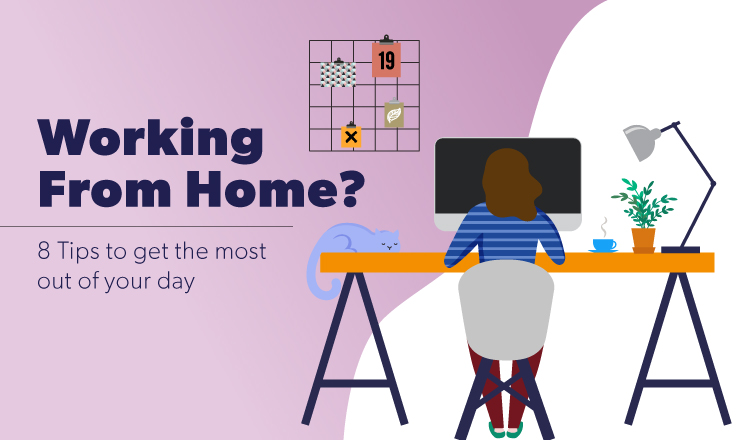Right now, millions of people around the world are going through a common learning experience as they work from home for the first time.
Check out these tips from Amy Hawkinson, director of alumni engagement for Purdue Global, who transitioned to full-time remote work two years ago.
Whether you’re new to working from home, or just want to up your game, check out and share these tips to make sure you’re getting the most from your day!
We’re all in this together. What has your experience been like during the coronavirus? If you have a story to share with the Purdue Alumni Association, please email [email protected] or leave it in the comments.
1. Maintain Your Routine
You might still be in your PJs, but you’re not taking the day off.
As much as possible, try to maintain your routine. You might need to make some adjustments — and that’s okay.
That said, if you typically work out in the morning, try to find a way to keep doing that.
Stuck at home? Consider trying out a yoga channel on YouTube instead of going to the gym.
Do you typically grab a coffee in the afternoon? Take 20 minutes to sit on your porch or in another room with a cup of coffee.
2. Office Space: To one have or not to have?
When I transitioned to working from home, I thought I needed a desk and defined space. I quickly learned that I didn’t need that to be productive. Nor did I need multiple screens. It helps me to switch up my working location regularly.
Other folks need a defined space that you can go to at the start of the work day and leave behind when you leave the digital office. If that’s the case, ask yourself what factors contribute to your productivity? Does it help to have a window? Will it be noisy? Do other family members spend a lot of time in that area? Will they be distracting?

It’s okay if your first choice isn’t the right one. Just take time to ask yourself why it isn’t working, and see if there is somewhere else where you might be more productive.
3. Dress for the day — or the door!
The common wisdom used to be to dress for the day. Now the saying is dress for the door.
Either way, put the effort in to wear something you don’t mind answering the door in. That way, you’re ready to go — whether you’re actually answering the door or jumping on Skype for a meeting.
If you have an important meeting, the old adage holds. Dress for success, whether you’re in person, on the phone, or videoconferencing.
4. Take a Break
While many of us wouldn’t think twice about taking 15 minutes to chat with a coworker or walk 10 minutes to grab lunch during the work day, things can suddenly feel very different when we’re working from home.

But it’s okay to take a break! Take time for lunch, a walk outside to clear your mind, or even to fold the laundry.
I recommend that you make sure your direct reports and manager have your cell phone in case of any truly urgent needs. But, just as you wouldn’t walk by someone’s desk, see it empty, and assume they’re goofing off somewhere, you shouldn’t make that assumption just because someone doesn’t reply immediately when you ping them.
5. Stay Productive
What motivated you to get work done in the office?
Use some of those same techniques. If it’s keeping a list, do it. If it was pulling a data report on a regular basis, still do that. If it’s having a brainstorm with colleagues, do it digitally.
6. Take Advantage of Not Having Distractions
With fewer meetings and no coworkers stopping by your desk, you might find yourself getting through your work faster than you would in the office. Don’t take this extra time for granted!
Consider checking out LinkedIn Learning courses to develop soft skills that could help you in the future, read up on industry trends, or invest time in those “nice-to-have” projects you never find the time for.
7. Stay Connected
Just because you’re not in the same building doesn’t mean you can’t stay connected! Email, text, or call your colleagues intermittently to say hi. Ask how they’re doing, share what you’re working on or something cool you accomplished!

8. Technology: Friend or Foe?
If you’re hosting a meeting on Zoom, Webex, or another platform where video calls are possible, more cameras turned on could mean pixelated images. If someone is presenting, consider requesting that everyone else turn off their cameras so they can focus on the speaker and enjoy a clearer video feed.
At some point, it’s inevitable. You’ll find yourself disconnect from a videoconference or phone call. Don’t worry! It happens. A colleague can fill you on what you missed.
Finally, if someone is late to a meeting, ping them. Their alert may not have gone off or they didn’t notice the time.
Think of it this way: If you were on your way to a meeting in the office and saw a coworker still at their desk who had to attend the same meeting, you wouldn’t just walk by. You’d stop to make sure they were on their way.

